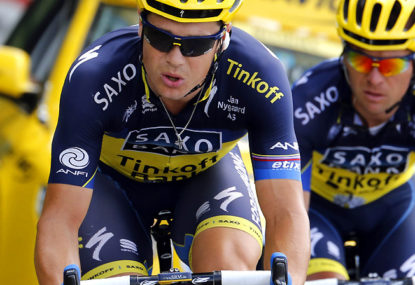'I've just won a stage of the Tour de France, mate!': Hindley grabs yellow jersey as Aussie blows Tour apart
Australia's Jai Hindley has said he is "lost for words" after a shock stage victory at the Tour de France earned him the leader's…

The Saxo-Tinkoff team released the following statement relating to Michael Rogers’ positive doping test on their website on Wednesday evening CET time:
“Today, Michael Rogers has been advised by the UCI that he returned an adverse analytical finding for clenbuterol in an A-sample taken in connection with Japan Cup on the 20th October 2013.
“Michael Rogers immediately informed Saxo-Tinkoff’s management about the notification from the UCI.
“The Australian explained to the team management that he never ingested the substance knowingly nor deliberately and fears that the adverse analytical finding origins from a contaminated food source.
“Michael Rogers participated in Tour of Beijing the week before the Japan Cup and travelled directly from China to Japan.
“Michael Rogers now has the opportunity to request an analysis of his B-sample. According to the team’s Anti Doping policy, Michael Rogers is provisionally suspended with immediate effect.”
Rogers was not the only rider this week to be found to have Clenbuterol in his system. Joining him was Belgium’s Jonathan Breyne (Crelan-Euphony), who rode in the Tour of Taihu Lake, also in China, on November 5.
This is of course the same drug that was found in Alberto Contador’s system and both Rogers and Breyne are claiming, as the Spaniard did, that he ingested the drug unknowingly after eating tainted food.
While Contador’s claim aroused some obvious questions as the drug is not commonly found in beef in Spain, Clenbuterol is known to be used in the meat industry in China. There have been other cases of athletes testing positive for the drug and support from WADA for their own claims that the drug was ingested unknowingly.
In 2011, a study by a WADA-accredited lab in Cologne, Germany, found that 22 of 28 travellers returning from China tested positive for low levels of clenbuterol, “probably from food contamination”.
WADA chief David Howman said at the time that:
“There seems to be some evidence that some beef in China may have been stimulated in their growth by the use of steroids.
“We have written to the Chinese minister to ask for a full explanation of what happens in the industry in China. We’re waiting for a response.”
There’s also precedent of riders having tested positive for the drug after travelling to a country that uses Clenbuterol in cattle being cleared to race soon after. In early 2012 Dutch XC rider Rudi van Houts was cleared after testing positive in 2011.
At that time, Dutch officials decided not to ban Van Houts, yet though he was not acquitted he was found “guilty without punishment”.
However, Chinese rider Fuy Li, then with Radioshack, did receive a two-year ban for the same drug showing up in his system in April 2010. He was furious with the ban, as was the Chinese cycling federation and as were Chinese cycling fans.
However, he does hail from a nation where the Chinese swimming team is banned from eating beef in their own nation. It’s worth noting too that in 2011 WADA released a statement warning riders to take care when travelling to Mexico and China, lest they eat contaminated beef.
And so what exactly is the attitude of the authorities to cyclists claiming that they ingested Clenbuterol-infected beef unwittingly?
As the case of the Dutch rider van Houts and the cases of Li and Contador showed, it is one that is difficult to work out.
For example, though Van Houts was not made to serve a full suspension, when Contador received his ban, WADA president John Fahey said:
“Every time a cheat is caught out, the decision is very good news for anti-doping, no matter what discipline he practices or which flag he defends.”
Rogers is not new to controversy over doping-related matters, which is also worth noting.
In May 2011, Rogers was included on the leaked UCI report that ranked riders according to the level of suspicion with which the UCI regarded them.
He was placed in a category that said that the riders included showed “overwhelming evidence of some kind of doping, due to recurring anomalies, enormous variations in parameters, and even the identification of doping products or methods”.
Rogers also left Team Sky for Tinkoff, a move that coincided with the team management requesting all riders and staff to sign an agreement saying they had never doped.
Rogers claimed the move was for financial reasons, and it is best not to speculate on that, but, at the same time, it should be noted.
So, where does this leave the fans? Further in the mire, one could argue.
As ever, I hope that these riders did indeed ingest the drug unknowingly, and there are precedents for this having happened before, but this is a sport in which riders have shown themselves willing to take banned substances to get ahead time after time.
Might a rider be tempted to take Clenbuterol knowing that they are going to or in a nation where there is a history of tainted beef?
Cycling, as with life, tells that anything is possible.
That we simply can not be sure about anything these days is a sign of where our beloved sport currently resides in relation to banned substances.
And as cases like that of Stuart O’Grady prove, we simply can no longer be sure about anything other than the fact that we can be sure of nothing.
What will the outcome be? With Brian Cookson and the UCI looking to send a clear message to riders, sponsors and fans about doping and their eagerness to tackle the issue more firmly that in MacQuaid’s day, a ban for both riders looks on the cards.